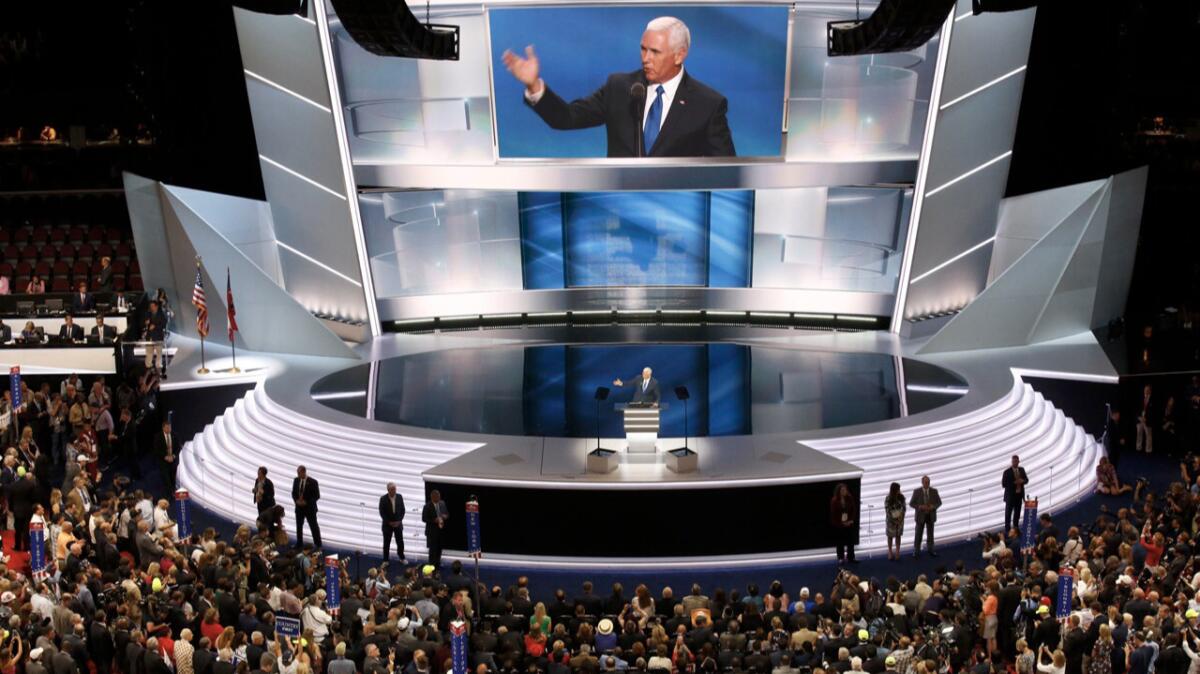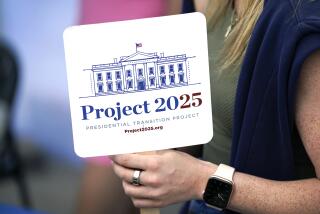‘Barbaric,’ ‘cultural genocide’ and a ‘return to Maoism’: GOP platform’s tough words rile China

- Share via
Reporting from Beijing — The platform adopted by delegates to the Republican National Convention this week in Cleveland mentions China 21 times — far more than Russia (10 times), Iran (seven), North Korea (three) or Syria (twice).
Although the document borrows some language from the party’s 2012 platform, which called China a currency manipulator and unfair trader, the new platform says the GOP has had a major change of thinking about the world’s No. 2 economy.
“China’s behavior has negated the optimistic language of our last platform concerning our future relations with China,” it says. “The liberalizing policies of recent decades have been abruptly reversed, dissent brutally crushed, religious persecution heightened, the Internet crippled, a barbaric population-control two-child policy of forced abortions and forced sterilizations continued, and the cult of Mao revived.”
Beijing has not taken kindly to the criticism. Chinese Foreign Ministry spokesman Lu Kang said Thursday that American political parties should “view China’s development objectively and reasonably and understand correctly issues related to China-U.S. ties.”
Using a typical Chinese locution to avoid mentioning a person or entity by name, he added, “We hope relevant parties will stop groundlessly accusing China and interfering in China’s domestic affairs, and will do more to promote trust and cooperation between China and the U.S.”
China’s behavior has negated the optimistic language of our last platform concerning our future relations with China.
— GOP’s 2016 platform
The 2016 platform is a stinging attack. “Critics of the regime have been kidnapped by its agents in foreign countries,” it says. “To distract the populace from its increasing economic problems and, more importantly, to expand its military might, the government asserts a preposterous claim to the entire South China Sea and continues to dredge ports and create landing fields in contested waters where none have existed before, ever nearer to U.S. territories and our allies, while building a navy far out of proportion to defensive purposes.”
The platform complains that during a military pageant in September, China was “parading their new missile, ‘the Guam Killer,’ down the main streets of Beijing, a direct shot at Guam as America’s first line of defense.” Meanwhile, the party said, “cultural genocide continues” in the regions of Tibet and Xinjiang, and the “autonomy of Hong Kong is eroded.”
The GOP document also blasts any American company that “abets” Chinese censorship efforts and tracking of dissidents, calling such activities “a disgrace.” While it does not mention any corporations by name, American tech firms from Microsoft to LinkedIn have agreed to censor their products to be allowed to operate in China.

Indiana Gov. Mike Pence, Republican nominee for vice president, speaks at the Republican National Convention
American universities also come under fire. U.S. colleges should “dissociate themselves” from “academic or cultural operations under the control of the Chinese government,” the GOP said, a reference to the 500 China-funded Confucius Institutes — language and cultural study centers that Beijing has seeded around the world. There are more than 100 in the U.S.
Critics of the institutes say they come with unreasonable strings attached, such as restrictions on discussion of sensitive issues like Tibet and Taiwan, or the violent crackdown in Tiananmen Square in 1989. In 2014, the University of Chicago and Penn State closed the Confucius Institutes on their campuses.
We hope relevant parties will stop groundlessly accusing China and interfering in China’s domestic affairs.
— Lu Kang, Chinese Foreign Ministry spokesman
The Global Times, a state-run Chinese tabloid known for its nationalistic views, called the platform “really disturbing,” saying the 66-page document has “given in to Trump’s wackiness. Trump’s personal beliefs have astonishingly become the platform’s beliefs.” Although China-bashing often happens in U.S. elections, the paper called the severity of this year’s round “one of the harshest.”
Noting the shrill, negative tone of the convention and jeering calls to jail Hillary Clinton, the paper said the gathering has reminded people in China of the “struggle sessions” Mao Tse-tung unleashed during the 1966-1976 Cultural Revolution, a period the paper called “calamitous.”
In 2012, when Mitt Romney was the Republican nominee, China was also less than thrilled with the GOP platform. The Foreign Ministry spokesman at the time, Hong Lei, using language similar to Lu’s this week, said, “U.S. politicians from any party should realize it is also in the interests of the U.S. ... to treat China’s development in an objective, rational way.” He added that parties should “understand relevant issues of Sino-U.S. relations correctly, stop groundless criticism of China and interfering in China’s internal affairs, and do more to promote mutual trust and cooperation.”
Four years ago, the GOP platform noted that China had “engaged in a number of activities that we condemn” — such as building up its military, suppressing human rights in Tibet and Xinjiang and engaging in religious persecution. But the party emphasized positives, noting it welcomed “the emergence of a peaceful and prosperous China, and we will welcome even more the development of a democratic China.”
China’s rulers, it said then, “have discovered that economic freedom leads to national wealth. The next lesson is that political and religious freedom leads to national greatness. The exposure of the Chinese people to our way of life can be the greatest force for change in their country. We should make it easier for the people of China to experience our vibrant democracy and to see for themselves how freedom works. We welcome the increase in trade and education alliances with the U.S. and the opening of Chinese markets to American companies.”
This year, the GOP says it still welcomes Chinese “students, tourists and investors.”
“The return to Maoism by China’s current rulers is not reason to disengage with the Chinese people or their institutions,” the 2016 platform says.
The Democrats have yet to finalize their 2016 platform. A draft released in early July mentions China just seven times, down from 14 in 2012. It says that “China and other countries are using unfair trade practices to tilt the playing field against American workers and businesses. … Democrats will use all our trade enforcement tools to hold China and other trading partners accountable.”
See the most-read stories in World News this hour »
The Democrats’ draft adds that a Hillary Clinton administration would “work with our allies and partners to fortify regional institutions and norms as well as protect freedom of the seas in the South China Sea. We will push back against North Korean aggression and press China to play by the rules. We will stand up to Beijing on unfair trade practices, currency manipulation, and cyberattacks. And we will promote greater respect for human rights, including the rights of Tibetans.”
Both the Democrats and Republicans agree this year that China should put more pressure on North Korea to dispose of its nuclear weapons and missiles.
While the Democrats say they will “press China to restrain North Korea, and sharpen the choices for Pyongyang to compel it to abandon its illegal nuclear and missile program,” the GOP says it urges “China to recognize the inevitability of change in the Kim family’s slave state” and to “hasten positive change on the Korean peninsula.”
Yingzhi Yang and Nicole Liu in The Times’ Beijing bureau contributed to this report.
Follow me on Twitter @JulieMakLAT.
ALSO
Cruz’s provocative speech on Day 3 of Republican convention sparks a renewed war over conservatism
Court convicts youthful leader of Hong Kong’s pro-democracy protests
Trump’s NATO policy puts American interests first, former Trump advisor says
More to Read
Sign up for Essential California
The most important California stories and recommendations in your inbox every morning.
You may occasionally receive promotional content from the Los Angeles Times.











